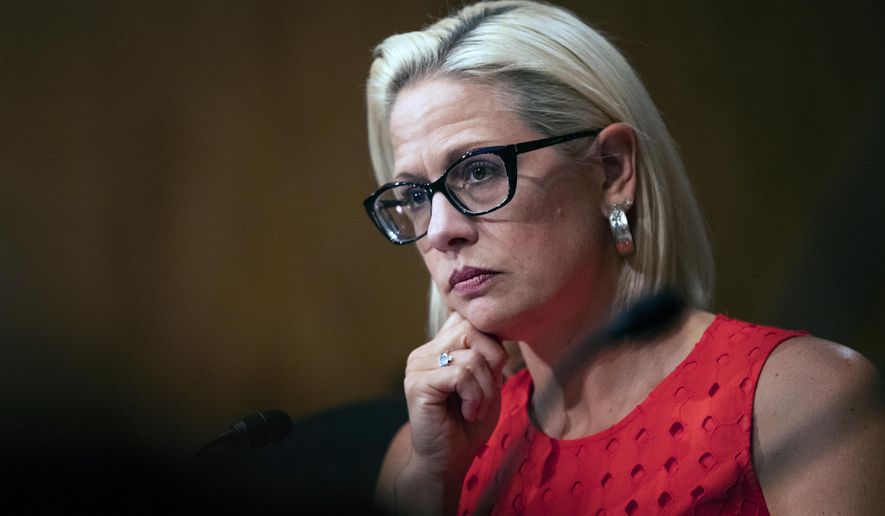President Biden’s plan to blow up the Senate filibuster and pass a partisan rewrite of the nation’s voting laws went down to fiery defeat Thursday at the hands of fellow Democrats.
Mr. Biden’s efforts hinged on all 50 Senate Democrats agreeing to weaken the filibuster, which requires 60 votes to advance most legislation. That proved impossible when Sen. Kyrsten Sinema, Arizona Democrat, declared her opposition to ripping up the long-standing rule.
“The honest to God answer is I don’t know whether we can get this done,” said Mr. Biden. “But one thing for certain, like every other major civil rights bill that came along, if we miss the first time, we can come back and try it a second time.”
Democratic leaders said it was necessary to use the “nuclear option” on Senate rules because of a slew of new election laws in Republican-run states. Mr. Biden, in particular, said this week in a speech in Georgia that those laws disenfranchise people of color.
“We miss this time, then the state legislative bodies continue to change the law, not as to who can vote but who gets to count the vote. It’s about election subversion,” he said. “That’s what makes this so different than anything else we’ve ever done.”
The argument failed to convince moderate Democrats like Ms. Sinema. While Ms. Sinema pledged support for Mr. Biden’s effort to overturn state election laws, she said that doing so at the expense of the filibuster would only further the “disease of division.”
SEE ALSO: Schumer punts on election law, but vows vote on blowing up filibuster
“Eliminating the 60-vote threshold will simply guarantee that we lose a critical tool that we need to safeguard our democracy,” she said.
Still, Mr. Biden wasn’t completely calling it quits. He set up an evening meeting at the White House with Ms. Sinema and another Democratic holdout, Sen. Joe Manchin III of West Virginia, in a last-ditch bid to win them over.
Democratic leaders and party operatives have been strong-arming those two senators for weeks.
In her floor speech, Ms. Sinema said that every time Senate leaders weakened the filibuster to “protect a cherished value,” it has “led us to more division, not less.” In particular, Ms. Sinema highlighted the 2013 decision by Democrats that eliminated filibusters for confirming Cabinet and judicial nominees.
The change allowed President Trump to nominate and confirm three Supreme Court justices in near party-line votes, shifting the balance of the highest court to the right.
“Eliminating the 60-vote threshold on a party-line [vote], with the thinnest possible majorities, to pass these bills that I support will not guarantee that we prevent demagogues from winning office,” Ms. Sinema said.
SEE ALSO: House passes partisan voting measures, setting up a showdown in the Senate
Preempting the president, Ms. Sinema staked out her position in a Senate floor speech shortly before Mr. Biden met with Senate Democrats at the Capitol to press his cause.
Democrats were quick to chastise Ms. Sinema for handing the president a defeat on an issue that is particularly important to the party’s base.
“The House showed where it stands. We won’t shrink from protecting our democracy and the voting rights of all Americans,” said Rep. Ruben Gallego, an Arizona Democrat who has been pitched as a potential primary challenger to Ms. Sinema in 2024. “It’s past time for the U.S. Senate and Sen. Sinema to do the same.”
Republicans praised Ms. Sinema for standing above partisan politics.
“It was extraordinarily important,” said Senate Minority Leader Mitch McConnell, Kentucky Republican. “She, with a conspicuous act of political courage, saved the Senate as an institution.”
Mr. Biden’s defeat also upended the Senate’s deliberations.
The chamber initially was set to begin debate on two recently passed House bills: the Freedom to Vote Act and the John Lewis Voting Rights Act.
The president said the bills were needed to abrogate the slew of voting laws enacted by Republican-led states since the 2020 elections. Democrats insist the laws threaten American democracy.
Republicans say the state laws are vital to securing elections with safeguards such as voter ID laws and restrictions on mail-in ballots. They say the Democrats’ bills would nationalize elections and are designed to give Democrats an edge at the ballot box.
The Freedom to Vote Act requires states to offer same-day voter registration, makes Election Day a national holiday and mandates 15 days of early voting. It also requires universal vote-by-mail, creates a taxpayer-backed public financing system for House elections and imposes new restrictions on states’ authority to draw electoral districts.
The John Lewis Voting Act would grant the Justice Department sweeping powers to oversee state elections. In some cases, according to the bill, states would even have to secure federal approval before implementing new voting laws.
Although both bills were expected to be defeated by a Republican filibuster, Senate Majority Leader Charles E. Schumer, New York Democrat, said he hoped the debate would persuade wayward Democrats to agree to the nuclear option.
“All of us must make a choice about whether or not we will do our part to preserve our democratic republic in this day and age,” Mr. Schumer said.
He was left without a clear path forward.
Putting up a rules change that will fail could further alienate moderate Democrats. It would force them, especially those in tough reelection races this year, to vote for a controversial provision with no hope of success.
• Haris Alic can be reached at halic@washingtontimes.com.




Please read our comment policy before commenting.